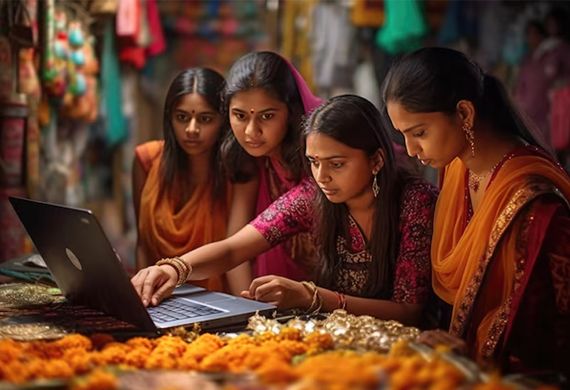
30 Lakh Crore Credit Gap Facing Indian MSMEs, Gap Even Larger for Women-Owned MSMEs
By: WE Staff | Wednesday, 14 May 2025
- A fresh SIDBI report reports a ₹30 lakh crore credit gap in India's MSME sector
- This shortfall accounts for approximately 24 percent of MSMEs' total credit needs
- The credit gap is even larger increasing to 35 percent for women-owned MSMEs
The recent study by the Small Industries Development Bank of India (SIDBI) titled "Understanding Indian MSME Sector: Progress and Challenges" has shown a ₹30 lakh crore credit gap, the largest being suffered by India's micro, small, and medium enterprises (MSMEs). This credit gap represents approximately 24 percent of the total demand for the sector and spikes abruptly to 35 percent among MSMEs that are women-led.
The report, drawing from a survey of more than 2,000 MSMEs in 19 industries, presents an in-depth analysis of the growth, digitalization, and ongoing structural challenges of the sector. Though enjoying formal policy endorsement, most MSMEs—particularly micro units—are finding it difficult to access sufficient and timely credit. Borrowing informally is still very common, as 12 percent of the micro units continue to borrow from non-institutional sources, in contrast to a mere 2–3 percent in small and medium units.
Women-owned MSMEs now account for 26.2 percent of proprietary businesses, as per the ASUSE 2023–24 surveys. Although 76 percent of these firms have some level of access to credit, 41 percent indicate that limited financing and stiff market competition are major impediments to growth.
The industry is also in the process of undergoing a digital transformation: 18 percent of MSMEs increasingly utilize digital lending platforms, and 90 percent make digital payments. Still, restricted market access is an issue, with almost 70 percent of MSMEs continuing to rely on conventional marketing channels, limiting their own growth potential.
India's MSMEs have consolidated their contribution to exports, with their proportion of merchandise exports increasing from 43.6 percent in FY23 to 45.7 percent in FY24. Export-oriented companies reflect greater technology adoption but still bear challenges related to supply chain disruptions and financing constraints.
Sustainability is gaining momentum, as 31 percent of the MSMEs embraced energy-saving measures and 21% incorporated renewable energy resources. Yet 33 percent acknowledge limited awareness as the primary hurdle towards increased application of green processes. The industry witnessed swift formalization through mediums such as Udyam Registration and Udyam Assist, and the count of registered MSMEs jumped from 2.5 crore in March 2024 to over 6.2 crore in March 2025.
Shortages of skilled labor are still a pressing issue, especially in industries like defence production, textiles, hospitality, and tiles. Infrastructure and technology deficits are also hindering productivity in industries like auto components, iron and steel, and logistics.
The SIDBI report urges targeted interventions—particularly for women entrepreneurs, digitally underdeveloped businesses, and service MSMEs. Increasing access to credit, deepening digital inclusion, and enhancing sustainability awareness are identified as critical steps toward realizing the sector's full potential.
Most Viewed
- 1 Women's Health Startup HerMD Closing Doors Amid Industry Challenges
- 2 5 Famous Women in Indian Armed Forces
- 3 Saudi Women No longer Require Male Permission for Clothing Choices, says Prince MbS
- 4 Kolkata Medtech Startup Innovodigm Raises Rs 5.5 Crore Seed Funding Led by IAN Group
- 5 Yamunanagar's Kashish Kalra Honoured after Securing 111th Rank in UPSC Civil Services Exam
- 6 Madurai Appoints Its First Woman Corporation Head
- 7 IAS Vijayalakshmi Bidari Appointed as the new Nagpur Divisional Commissioner
- 8 American Entrepreneur Lucy Guo Overtakes T Swift to become Youngest Female Billionaire
- 9 ICC Women's World Cup 2025 Trophy Showcased at Indore's Holkar Stadium
- 10 Aparna Saxena's Beauty Venture AntiNorm Launches in India
- 11 Vidya Nataraj Co-Founded BlueStone Jewellery & Lifestyle files IPO
- 12 5 Women Freedom Fighters of India
- 13 Dr. G Krishnapriya appointed as CEO for Trichy
- 14 M3M & Sirona Partner to Introduce Menstrual Hygiene Vending Machines in 15 Locations
- 15 Punjab Govt launches SHE Cohort 3.0 Supporting Tech-led Women Startups
- 16 Indian origin Lawyer, Sweena Pannu appointed as the US New Superior Court Judge
- 17 The Aurora Tech Award recognizes 4 Indian Women-led Startups
- 18 Kerala's Republic Day parade featured an all-female tableau
- 19 Manisha Kabbur Becomes Karnataka's First Woman International Karate Coach
- 20 Director K. S. Ravikumar's Daughter Maalica Ravikumar Launches Life Coaching Company 'Evergrowth Academy' for Women
- 21 Leezu's Raises Pre-Seed Funding to Accelerate Growth in Sexual Wellness Industry
- 22 Sattu: Super-easy summer drink for PCOS gut healing
- 23 Swathi Nelabhatla creates Sitha App, India's First Women-Exclusive Gig Platform
- 24 7 Timeless Female Kathak Dancers & their Iconic Legacies
- 25 Meet 7 Iconic Women Architects of Modern India & their Most Impactful Work
- 26 This Woman-led Insuretech Startup is Helping Bridge the Education Financing Gap in India
- 27 Women Leaders Share Lessons Learnt from India Women's WC Win
- 28 5 Enterprising Women Founders Powering Singapore's Tech & Innovation Landscape
- 29 4 Women. 4 Stories. One Vision for Smarter, Stronger Healthcare
- 30 Global Gender Gap Narrows to 68.8%, But Full Equality 123 Years Away: WEF Report 2025
- 31 Changemakers: 7 Women Entrepreneurs Taking the Make in India Movement Forward
- 32 Meet Lucy Guo, The Youngest Self-Made Female Billionaire Disrupting Tech
- 33 How Women are Driving India's Festive Online Shopping Surge


.jpg)



